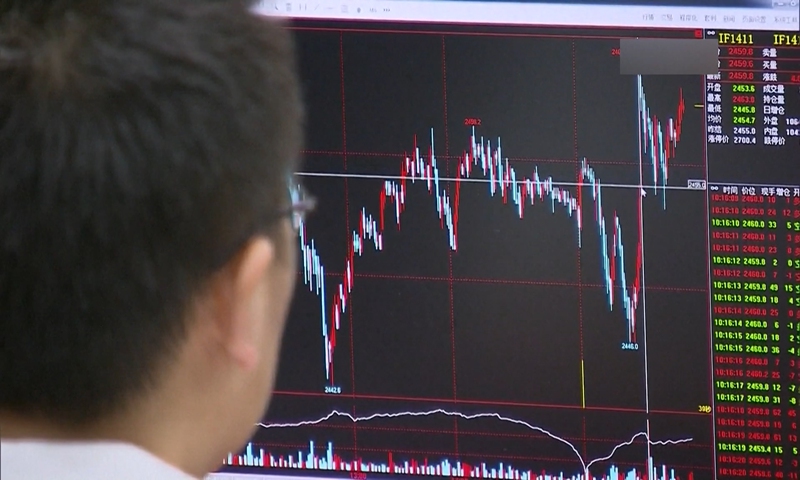
A trader follows the trend of the stock market File photo: VCG
Chinese state fund Central Huijin Investment (Huijin) said on Monday it had bought exchange-traded funds (ETFs) and will continue to do so, as Chinese stock market continued last week's slump on Monday.
More targeted and down-to-earth catalysts are needed, including state capital taking the lead with consistent share purchases regardless of short-term losses, industry observers said.
The benchmark Shanghai Composite Index dipped 1.47 percent to 2,939.29 at Monday's close, while the smaller Shenzhen stock market declined 1.51 percent and the Nasdaq-style ChiNext fell 1.69 percent. The Science and Technology Innovation Board 50 Index fell to a record low of 840.14.
On Friday, the Shanghai Composite Index tumbled below 3,000, a major psychological level, for the first time since October 2022.
Nearly 4,800 shares on the Shanghai and Shenzhen exchanges fell on Monday, while only more than 400 rose. Satellite navigation shares, 6G concept stocks and vehicle shares bucked the trend, while the largest losses were recorded among energy firms, brokerages, real estate companies, lithium battery makers and digital currency firms.
Qi Kezhan, founder of Merger China Group, a Beijing-based consulting firm and private investment fund, told the Global Times on Monday that the A-share downturn is mainly due to a lack of investor confidence and low levels of incremental capital.
"A 'big bang' of forceful policies or measures is likely," Qi noted, referring to measures that could really meet individual investors' needs instead of staying at the paperwork level.
"Investors need to see that state capital is putting real money into the market regardless of short-term losses. Continued investment from a long-term perspective will greatly help restore market confidence," Qi said.
On October 11, state-owned Central Huijin Investment (Huijin), after an eight-year hiatus, increased its holdings by more than 100 million shares worth about 477 million yuan ($65.2 million) of four top Chinese banks - Bank of China, Agricultural Bank of China, China Construction Bank and Industrial and Commercial Bank of China. The state fund plans to continue buying for the next six months.
On Monday, Huijin said in a statement that it has bought exchange-traded funds (ETFs) and will continue to increase its holdings in the future.
"Big moves with a 'bang' could be anticipated in the near future," Yang Delong, chief economist at Shenzhen-based First Seafront Fund Management Co, told the Global Times on Monday.
"Other moves include comprehensive loosening of curbs on the property market, resolving local government debt risks, and further cuts in interest rates and taxes," said Yang.
As signs of a bottoming out in A shares become clearer, some foreign funds sensed an investment opportunity, Yang noted.
Recently, UBS Group, Barclays and other foreign institutions frequently appeared on the list of the top 10 holders of newly established and listed ETFs.
Separately, Schroder Fund declared its first equity public offering product in China, according to the website of the Chinese securities regulator. In June, Schroders got the green light to operate a wholly foreign-owned public fund business in China.
Amid hype about China's economic collapse in recent months, many foreign media outlets have turned their focus toward the Chinese stock market, claiming that foreign capital has abandoned A-shares or other yuan-denominated assets.
As of Sunday, the net outflow of northbound funds (under Stock Connect programs) since the start of October had reached 37.19 billion yuan.
There is no need to build a mystique around the role of northbound capital, which is not a bellwether of A-share investment, nor should it be regarded as a barometer whether foreign investors are bullish or bearish on the Chinese stock market, according to Yang. Foreign capital only holds less than 10 percent of total A shares.
"Foreign capital has been scaling down investment in multiple markets, in particular in developing countries, since the start of the year, citing growing uncertainties rising from geopolitical tensions," said Qi, adding the move is not targeted at the Chinese capital market.
China's economic fundamentals will prop up the securities market, experts said. Third-quarter GDP growth came in stronger than expected, rising 4.9 percent from a year earlier.
Subsequently, many international investment banks raised their GDP growth forecasts for China this year. Citigroup now expects China's GDP to grow 5.3 percent, up from the previous 5 percent.
"China's economic prospects in 2024 will be better than this year ... and thus promote a rebound in the securities market," Yang said.



